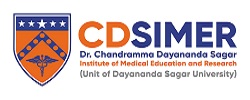Ragging which is a social evil can cause an ill effect on the student community. This may have a psychological and physical effect on a student. There is no Ragging at CDSIMER, DSU campus as the administration has taken several steps to curb ragging & indiscipline.
With respect to the Reference to clause (g) of sub – section (I) of Section 26 of the University Grants Commission Act, 1956, and Medical Council of India (Prevention and Prohibition of Ragging in Medical Colleges/Institutions) Regulations, 2009 all regulations will be followed strictly in the institute to root out ragging in all its forms.
Dear students please fill in the online Anti Ragging Affidavit by clicking the link: https://antiragging.in/affidavit_university_form.php
Step-by-step-guide-on-How-to-fill-Online-Anti-Ragging
Undertaking: https://www.dsu.edu.in/images/Step-by-step-guide-on-How-to-fill-Online-Anti-Ragging-Undertaking.pdf
In addition to the above all students and parents shall sign an undertaking every year before the commencement of the Academic year as instructed by the National Medical Commission (NMC). Also, the College Constitutes an Anti-Ragging Committee which shall be headed by the Principal & Dean as the chairperson.
TOLL- FREE NUMBER TO REPORT RAGGING: 1800-425-9911
MAIL ID: This email address is being protected from spambots. You need JavaScript enabled to view it.
-
Ragging constitutes of following acts:
- Any conduct by any student or students whether by words spoken or written or by an act which has the effect of teasing, treating or handling with rudeness a fresher or any other student;
- Indulging in rowdy or undisciplined activities by any student or students which causes or is likely to cause annoyance, hardship, physical or psychological harm or to raise fear or apprehension thereof in any fresher or any other student;
- Asking any student to do any act which such student will not in the ordinary course do and which has the effect of causing or generating a sense of shame, or torment or embarrassment so as to adversely affect the physique or psyche of such fresher or any other student;
- Any act by a senior student that prevents, disrupts or disturbs the regular academic activity of any other student or a fresher;
- Exploiting the services of a fresher or any other student for completing the academic tasks assigned to an individual or a group of students.
- Any act of financial extortion or forceful expenditure burden put on a fresher or any other student by students;
- Any act of physical abuse including all variants of it: sexual abuse, homosexual assaults, stripping, forcing obscene and lewd acts, gestures, causing bodily harm or any other danger to health or person;
- Any act or abuse by spoken words, emails, posts, public insults which would also include deriving perverted pleasure, vicarious or sadistic thrill from actively or passively participating in the discomfiture to fresher or any other student;
- Any act that affects the mental health and self-confidence of a fresher or any other student with or without an intent to derive a sadistic pleasure or showing off power, authority or superiority by a student over any fresher or any other student.
-
Actions to be taken on those students who indulge in ragging:
- Every single incident of ragging a First Information Report (FIR) will be filed without exception by the institutional authorities with the local police authorities.
- Depending upon the nature and the gravity of the offence as established the possible
punishments for those found guilty of ragging shall be any one or any combination of
the following:
- Cancellation of admission.
- Suspension from attending the classes.
- Debarring from appearing in any test/examination or other evaluation process.
- Suspension/Expulsion from the hostel.
- Rustication from the institution.
- Expulsion from the institution and consequent debarring from admission to any other institution.
- Collective punishment: when the persons committing or abetting the crime of ragging are not identified, the institution shall report to collective punishment as a deterrent to ensure community pressure on the potential raggers.

